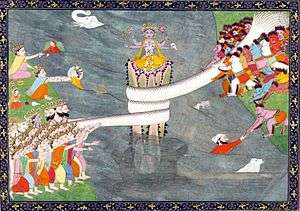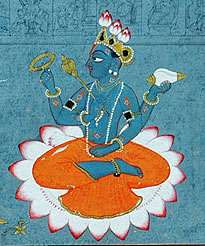Kurma
| Kurma | |
|---|---|
| The Turtle God | |
 Incarnation of Vishnu as a Turtle | |
| Devanagari | कूर्म |
| Affiliation | Turtle God and second Avatar of Vishnu |
| Weapon | Chakra |
| Consort | Lakshmi |
In Hinduism, Kurma (Sanskrit: कूर्म; Kūrma, lit. turtle) is the second Avatar of Vishnu, succeeding Matsya and preceding Varaha. Like Matsya, this incarnation also occurred in Satya Yuga. The temples dedicated to Kurma are located in Kurmai, Chittoor district, Andhra Pradesh, and Srikurmam, Srikakulam District , Andhra Pradesh.
Samudramanthan (The Churning of The Ocean)

[Purana] scripture indicates that the sage Durvasa had given a garland to Indra, the king of Gods. Indra placed the garland around his elephant, but the animal trampled it, insulting the sage. Durvasa then cursed the gods to lose their immortality, strength, and divine powers. After losing the kingdom of heaven, they approached Vishnu for help.
He advised that they had to drink the nectar of immortality to regain their glory. To obtain it, they needed to churn the ocean of milk, a body of water so large they needed Mount Mandara as the churning staff, and the serpent Vasuki as the churning rope. The Devas were not strong enough to churn on their own, and declared peace with their foes, the Asuras, to enlist their help.
Finally, Mount Mandara churned, but the force was so great the mountain began to sink into the ocean of milk. Taking the form of the turtle Kurma, Vishnu bore the mountain on his back as they churned the waters.[1][2] Fourteen precious things arose from the turbulent ocean, culminating with Dhanvantari, the physician of the gods, who brought with him the nectar of immortality.
The Asuras immediately took the nectar, and quarreled amongst themselves. Vishnu then manifested himself as the beautiful Mohini and tricked the Asuras to retrieve the potion, which he then distributed to the Devas. Though the Asuras realized the trick, it was too late—the Devas had regained their powers, and were then able to defeat their foes.
There are three temples dedicated to this incarnation of Vishnu in India: Kurmai of Chittoor District of Andhra Pradesh, Sri Kurmam in Srikakulam District of Andhra Pradesh, and Gavirangapur in the Chitradurg District of Karnataka. The name of the village Kurmai mentioned above originated as there is historical temple of Kurma Varadarajaswamy (Kurmavatar of Lord Vishnu), god in this village.[3] The temple located in Srikurmam in Srikakulam District, Andhra Pradesh, is also the Avatar of Kurma.
See also
| Part of a series on |
| Vaishnavism |
|---|
 |
|
Sampradayas |
|
Philosophers–acharyas |
|
Related traditions |
|
|
Notes
- ↑ "Hinduism - Shiva Parvati". msu.edu. Archived from the original on 28 September 2012. Retrieved 5 October 2015.
- ↑ Gopal, Madan (1990). K.S. Gautam, ed. India through the ages. Publication Division, Ministry of Information and Broadcasting, Government of India. p. 74.
- ↑ Nagendra Kr Singh (1997). Encyclopaedia of Hinduism. 1. Centre for International Religious Studies. p. 774. ISBN 978-81-7488-168-7. Retrieved 5 October 2015.
External links
![]() Media related to Kurma at Wikimedia Commons
Media related to Kurma at Wikimedia Commons